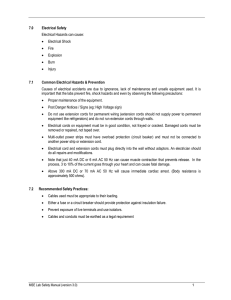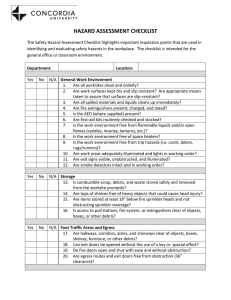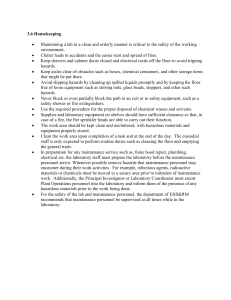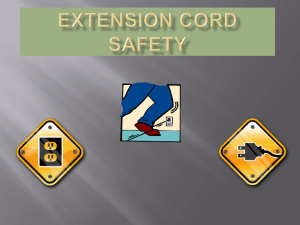ELECTRICAL SAFETY
advertisement
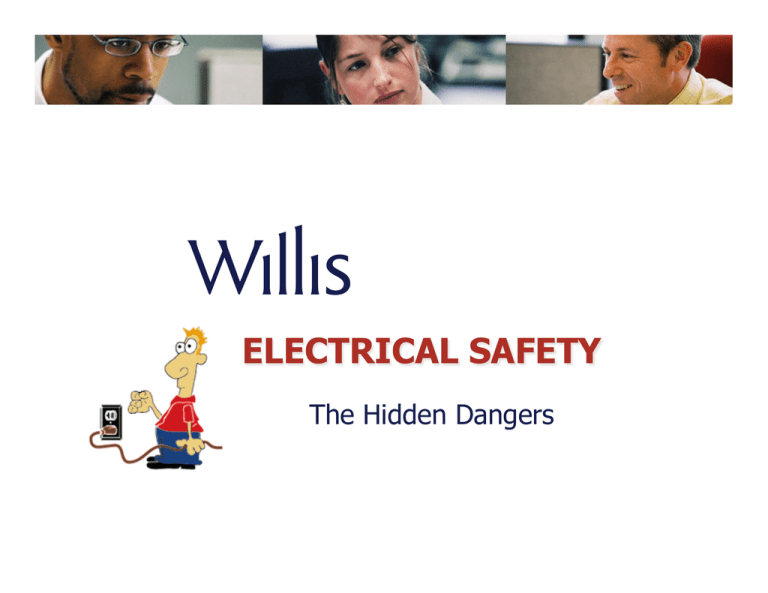
ELECTRICAL SAFETY The Hidden Dangers ELECTRICAL SAFETY ELECTRICAL SAFETY Introduction • Everyone should have some knowledge of the every day source of energy known as electricity • Everyone should also know about the potential hazards & how to avoid them. ELECTRICAL SAFETY ELECTRICAL SAFETY Common Hazards • Water & electricity • Overloaded circuits • Damaged insulation • Misuse of extension cables • Exposed wiring • Power cords in walkways. ELECTRICAL SAFETY ELECTRICAL SAFETY General Precautions • Never work on “hot” or energized equipment unless it is necessary to conduct equipment troubleshooting • Use extension cords only as temporary power sources • Do not connect too many pieces of equipment to the same circuit or outlet as the circuit or outlet could become overloaded. ELECTRICAL SAFETY ELECTRICAL SAFETY General Precautions • Be sure that ground-fault circuit interrupters (GFCI) are used in high-risk areas such as wet locations (GFCI's are designed to shut off electrical power within as little as 1/40 of a second) • Plug strips, such as those used on computers, should be plugged directly into outlets and not into extension cords or other plug strips • Inspect all equipment periodically for defects or damage. ELECTRICAL SAFETY ELECTRICAL SAFETY General Precautions • Grasp the plug to remove it from a socket never pull the cord • Keep all cords away from heat, oil and sharp edges • Always follow the manufacturer's instructions for use and maintenance of all electrical tools and appliances • All cords that are worn, frayed, abraded, corroded or otherwise damaged must be replaced • Keep equipment operating instructions on file. ELECTRICAL SAFETY General Precautions • Never touch an electrical appliance and plumbing at the same time • Always unplug electrical appliances before attempting any repair or maintenance • All electrical devices must be properly grounded with approved three wire plugs unless they are "double insulated". Grounding provides a safe path for electricity to the ground, preventing leakage of current in circuits or equipment. ELECTRICAL SAFETY General Precautions • All electrical equipment used should be UL or FM approved • Keep cords out of the way of foot traffic so they don't become tripping hazards or become damaged by traffic • Maintain a three-foot clearance around electrical panels • Never use electrical equipment in wet areas or run cords across wet floors. ELECTRICAL SAFETY General Precautions • Never plug in cords that are wet or touch electrical equipment with wet hands • Never use metal ladders when working near energized wiring • In case of an electrical fire don’t douse it with water. Turn off power if possible. If it’s small, extinguish it with a fire extinguisher • Only properly trained employees should work on electrical equipment. ELECTRICAL SAFETY ELECTRICAL SAFETY Extension Cords • Use extension cords properly and temporarily: • Cords must be UL listed and have 3 prongs • Do not use 2-prong, ungrounded cords in a lab • Do not run cords through walls, doors, under rugs, or across aisles • Do not repair cords--buy new ones. ELECTRICAL SAFETY ELECTRICAL SAFETY Conclusion • Any electrical equipment not operating properly should be: • Taken out of service immediately • Tagged or labeled as “Do Not Use” • Reported to the appropriate department or individual for repair • Do not attempt to repair any electrical equipment yourself unless you are properly trained and authorized to do so.
